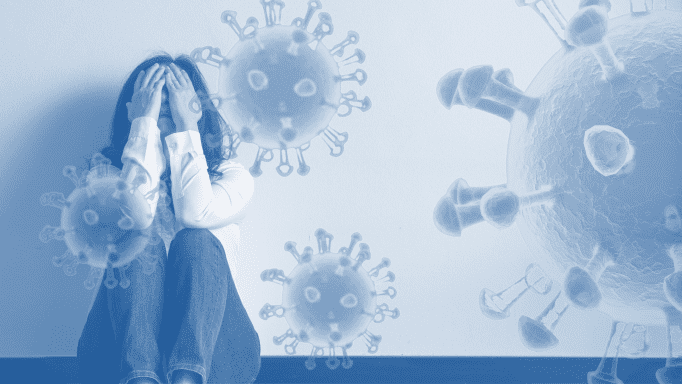The COVID-19 pandemic has upended life as we know it. While vaccines and expanded testing have offered some much-needed hope, the sustained stress and worry of the last 19 months have had a real effect on behavioral health.
During prolonged periods of uncertainty, humans can experience widespread emotional distress, which increases the risk for depression, anxiety, substance use disorders (SUDs), and more.
While there has been extensive research in disaster mental health — which finds that emotional distress from natural disasters, like hurricanes or acts of mass destruction, is pervasive in affected populations — life-threatening worldwide viral infections do not meet the same criteria.
Even if the pandemic isn’t a “conventional” natural disaster, mental and behavioral health issues are compounded by the COVID-19 crisis. Whether you worry about becoming infected with coronavirus, losing your job, childcare and school closings, or other issues, ongoing fear has a negative impact on our ability to cope with everyday life.
How COVID-19 affects Behavioral Health
Generally speaking, the pandemic has exacerbated risk factors generally associated with poor mental health (insecurity, confusion, isolation, and stigma) while also adversely affecting the protective factors we rely on for overall well-being (social connection, daily routine, access to health services, etc.).
In March 2021, the Kaiser Family Foundation found that 47% of adults say they “feel that worry or stress related to COVID-19 has had a major or minor negative impact on their mental health.”
Those with preexisting conditions, young children, or a history of mental health issues can be especially vulnerable. Additionally, “essential workers” and healthcare providers are particularly susceptible to emotional distress, according to the New England Journal of Medicine, “given their risk of exposure to the virus, concern about infecting and caring for their loved ones, shortages of personal protective equipment (PPE), longer work hours, and involvement in emotionally and ethically fraught resource-allocation decisions.”
In the United States, access to and coverage for mental health issues has been seriously inadequate long before the pandemic. Medical and insurance loopholes make it difficult for patients to find affordable care. In fact, only 56% of psychiatrists accept commercial insurance which means patients are faced with associated out-of-network costs. In rural areas, those seeking treatment often find a lack of specialized resources and available options.
For people with SUDs, the stress they’ve experienced related to COVID-19 may contribute to an increased urge to use and abuse substances like drugs and alcohol. According to The Recovery Village, there has been a 63% increase in substance usage among Americans as of December of 2020.
Additionally, overdoses in the U.S. have also increased since the early months of 2020. The American Medical Association reported at the end of last year that over 40 states have recorded rising numbers of opioid-related mortality. Physical isolation due to social distancing and quarinting is likely a factor in the increase of overdoses, as there is no one present to call 9-1-1 or administer life-saving medical care.
Individuals who are engaged in recovery can find themselves at a heightened risk of relapsing due to the stress surrounding the pandemic. Those that battle SUDs often rely on resilience-promoting activities, such as physical activity and social interactions. But fitness facilities and group meetings haven’t been as safe to engage in or as easy to access during the pandemic. With these lifelines all but cut-off or removed, there are fewer ways to manage unhealthy urges when working to maintain sobriety.
5 Ways to Promote Good Behavioral Health
When we neglect our behavioral health, it can cause a ripple effect. If you are feeling overwhelmed during these unpredictable times, there are things you can do to help promote good behavioral health.
Limit the news
The neverending news cycle can take a toll on our health. Recent research has found that consuming negative news can significantly affect your mood and produce feelings of sadness and anxiety. With so much uncertainty surrounding COVID-19 you might find yourself seeking out information, but be selective about what sources you turn to for news and updates. Set time limits for yourself when it comes to scrolling through social media or watching news programs. Consider disabling the push notifications and alerts on your phone.
Keep moving
Physical exercise is great for overall health. Exercise can take your mind off of your worries and help break the cycle of depression and compulsive thoughts. It also releases endorphins and natural feel-good chemicals that can be beneficial when you are coping with mental health issues and SUDs.
Stay healthy
Feeding your body healthy food can positively affect your physical — and mental — health. Fresh fruits and vegetables, foods rich in omega-3 fatty acids, leafy greens, nuts, seeds, and legumes are all good for your brain. Steering clear of processed foods and those that are high in sugar can help you avoid “the crash” that comes after eating junk food. The sudden drop in energy levels can contribute to anxiety, discomfort, headaches, irritability, and more, which can trigger behavioral health problems.
Maintain a routine
Setting and following a daily routine can help give you structure and a sense of normalcy that can offset stress. Sticking to a schedule for waking up and going to sleep each day, eating regular meals, and working out can give you stability in volatile times.
Seek help
If you have a diagnosed behavioral health disorder or are engaged in recovery, it is important that you stick to your treatment plan. If you are faced with overwhelming mental health or substance use problems, reach out and get help. There are ways to safely connect to healthcare providers from home through virtual visits and telehealth options.
At Thrive Peer Support, we provide behavioral health recovery services to people struggling with mental health and/or substance use disorders. Our Certified Peer Recovery Supporters use their personal experience to help clients stay engaged in recovery and achieve independence.



